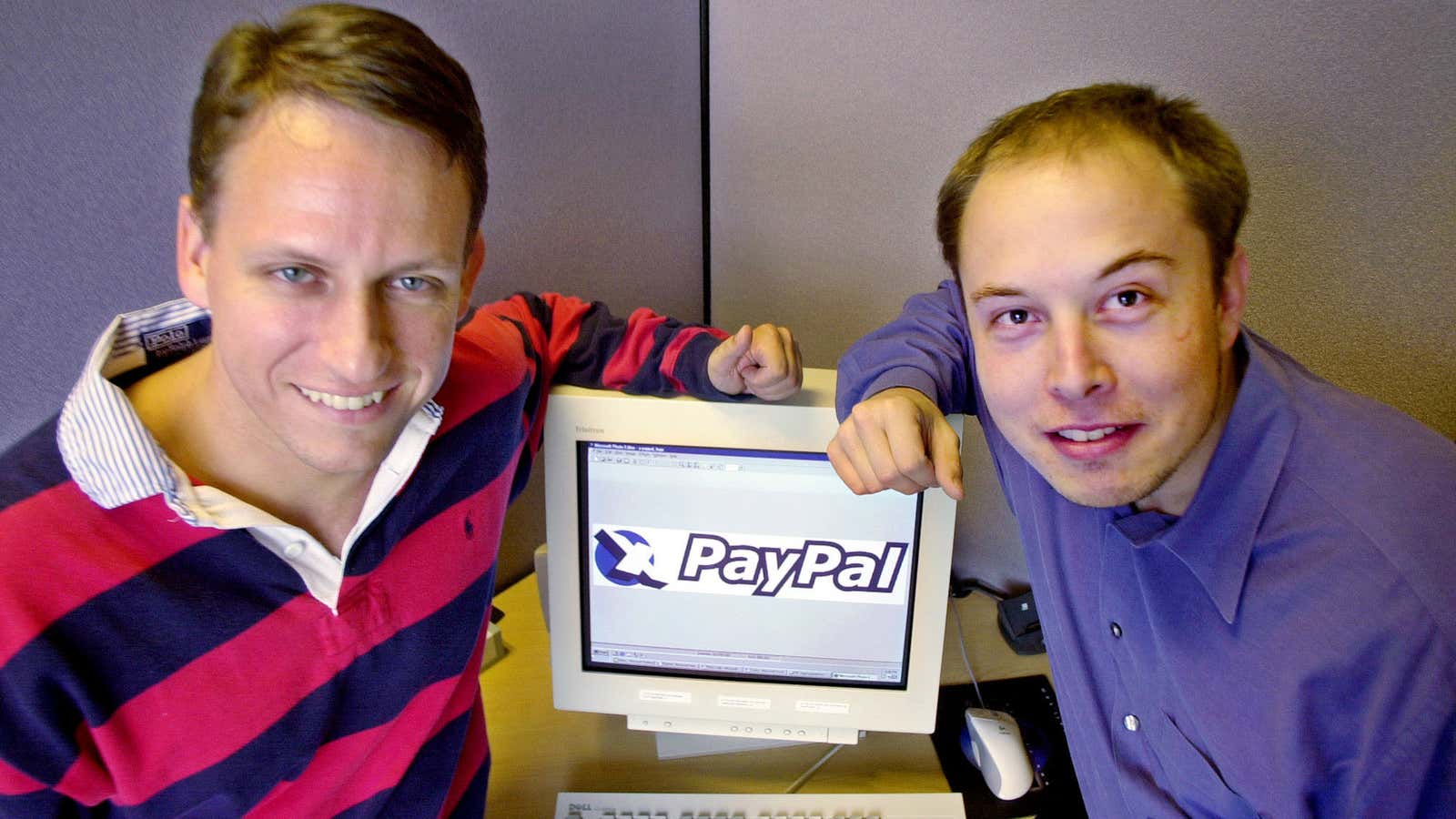The PayPal Mafia is one of Silicon Valley’s most storied successes. Elon Musk, Peter Thiel, and Reid Hoffman—members of its early team went on to create several unicorns including Tesla, Palantir, and LinkedIn. Their success is credited, in part, to the intense bond that they shared while building PayPal, which carried over into their future endeavors.
“Lifetime employment might be over, but a lifetime relationship remains the ideal,” Hoffman wrote in a LinkedIn post. “And as the alumni of PayPal know better than anyone, it can be extremely valuable. Unlike the free agency model, the alliance can and should persist even after an employee’s final tour of duty.”
Several members of the PayPal Mafia attended Stanford University around the same time, or knew each other from other university networks. “What’s unique is that the majority of the early PayPal employees, and the PayPal Mafia in general, were all recruited through a friendship network and not by a headhunter,” Connor Forrest wrote in Tech Republic.
America’s shift toward a “Freelance Nation” has several implications, one of which is that the future of work is increasingly relational. Weighing job opportunities based on pay, benefits, and perks is short-sighted. Instead, workers should look at the power of the networks they’re entering. The quality of our professional networks will have tremendous implications spanning several decades as the US moves into a gig economy where work is more fluid.
“In this day and age, people aren’t staying in their jobs for more than three years,” Alex Abelin, a former Google public affairs manager who recently launched professional network Liquid Talent, tells Quartz.
Abelin developed the on-demand job marketplace, which uses geolocation, after observing that many of his peers wanted to engage in more project-based, entrepreneurial work. He is advocating for a new classification beyond W2 and 1099 and points to a 2015 New York Times article about how the future of work will increasingly look like the production of a Hollywood film: talent coming together for a period of time to build something, and then dispersing. Employment relationships, he says, “are no longer a marriage”; they are alliances that can be rekindled throughout a lifetime.
Professional services companies like McKinsey, Bain & Co. and Boston Consulting Group have long maintained alumni networks and relied on their former employees to act as recruiters. They also have access to a strong network that operates at the highest echelons of society—for many, it’s an extension of their Ivy League networks—opening doors to coveted opportunities and serving as a safety net during down times.
“There’s a loyalty aspect to it,” Sean Brown, who manages McKinsey’s network of 30,000 alumni around the world, tells Quartz. “Simply saying ‘you left us’ is taking a short-term view. There’s mutual value to treating people well as they’re leaving, and keeping engaged with them after they left.”
Of course, there is a clear financial incentive for consultancies to invest in employees-as-potential-clients, but it’s also wise for any company to view its former employees as walking brand ambassadors.
Gretchen Spreitzer, a management professor at the University of Michigan’s Ross School of Business, offers Menlo Innovations, a software company known for its culture, as an example of a firm that actively maintains relationships with former employees, including those that it lays off during down times: “Three years later, these people are willing to leave their current jobs to return,” she tells Quartz.
Aman Advani, co-founder of fashion tech startup Ministry of Supply (MoS), tells Quartz that his relationship with former employer Deloitte has been integral to the company’s success. An early manager at Deloitte is now a MoS investor and board member, for example.
Deloitte’s head of alumni relations Sandy Viola tells Quartz that a key incentive for maintaining strong ties to former employees is the intensifying war for talent, noting that about 6% of its former employees return to the firm.
Taking the perspective of a lifetime alliance inherently draws out the best in both parties, with an emphasis on trust, instead of relying on perks and other superficial constructs for loyalty and productivity.
